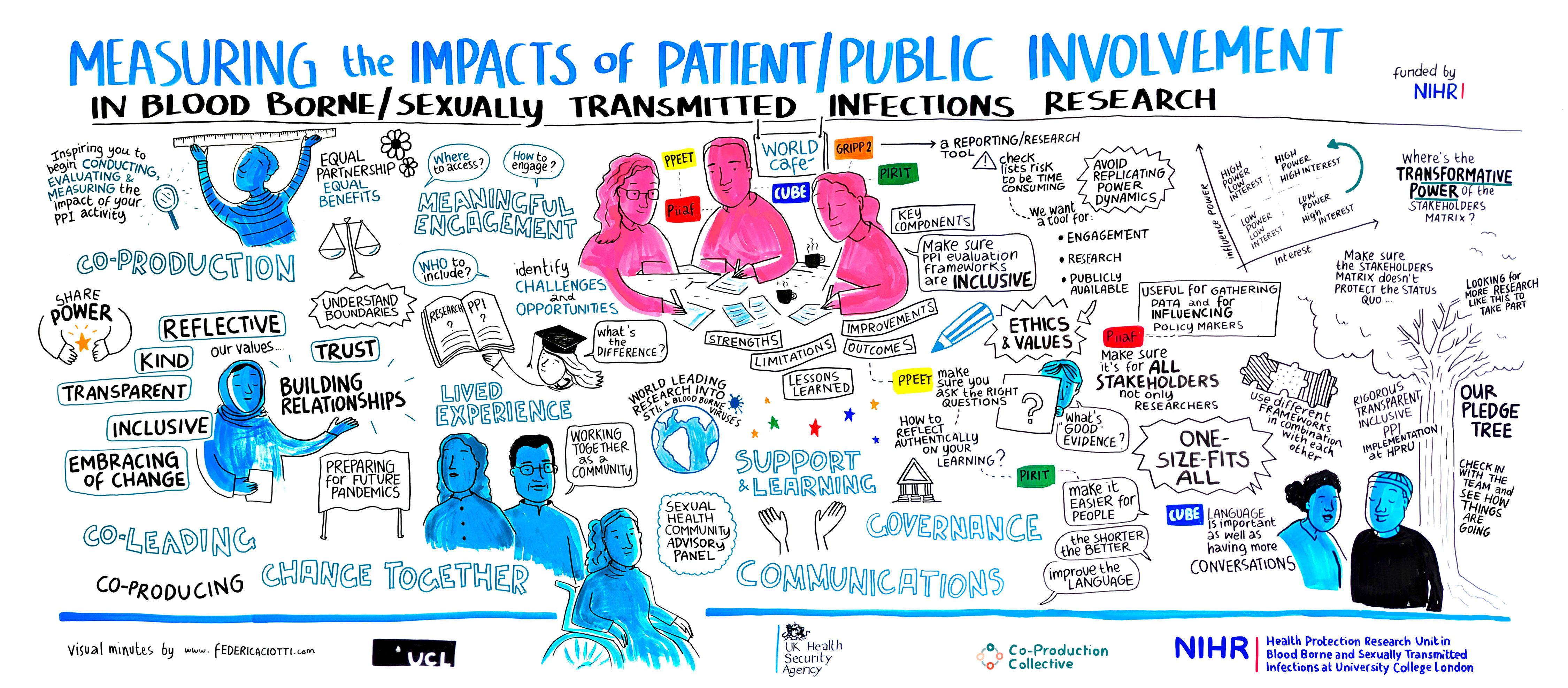
In this blog Tracy Hyman, a Public Health Practitioner and lived experience contributor reflects on her involvement in co-producing a workshop aimed at exploring evaluation methods for Patient and Public Involvement (PPI) projects focused on blood-borne and sexually transmitted infections (BBSTIs). She discusses the planning process, what it was like to be part of a co-production team, and how the workshop went.
I have been involved in the UCL Sexual Health Community Advisory Panel since Autumn 2023, sharing my lived experience. Most recently I have been involved in the Patient and Public Involvement (PPI) evaluation project taking place at the NIHR Health Protection Research Unit in Blood Borne and Sexually Transmitted Infections (HPRU BBSTI) at UCL. I helped to co-produce and facilitate a workshop looking at different PPI evaluation framework models. In this blog, I will share my experience of being involved in co-production and reflect on the experience.
Workshop background
PPI is vitally important as it brings lived experience into the heart of research, enabling inclusive and impactful conversations to help reduce barriers and improve engagement in diagnosis and treatment. It involves research that is done ‘with’ members of the public, rather than ‘to’ or ‘for’ them, and co-production is one approach to this. Co-production is where researchers, practitioners and the public work together, sharing power and responsibility from the start of a project.
PPI is well developed in HIV research, but less so in Blood Borne Virus (BBV) and Sexually Transmitted Infection (STI) research. When it is used, evaluation is sometimes missed. This workshop was developed with NIHR BBSTI pre-application support funding to review the existing PPI evaluation frameworks, working with key stakeholders to identify suitable measures to use within the HPRU.
How the workshop was co-produced
After being chosen to be involved in co-producing the workshop, I attended three online meetings, plus the workshop day itself and a reflection meeting post-event.
During these meetings we:
- Spent time getting to know each other
- Decided on team values, ways of working and how we make decisions
- Decided goals for the workshop
- Reviewed attendees of the workshop and decided who else needed to be invited
- Planned the workshop agenda, including choosing what activities would be most useful
Each meeting was well structured and allowed opportunities to not only plan for the workshop but also get to know each other. At the first of these meetings, we discussed team values and how we would work together as a group. It was identified that due to time constraints certain elements had been decided in advance, such as the location of the workshop, but we were very much included in as many decision-making opportunities as possible. One of these was to have Federica Ciotti drawing live on a display board in the room, so we could see the ideas from the workshop come to life in real time. The other alternative would be a summary drawing to share after, but having her there to show our journey as the day progressed was brilliant.
I particularly enjoyed the ‘getting to know you’ activities. Ice breakers can feel a little forced and anxiety inducing, but the ones chosen were a little bit different. As a group we created a team bookshelf using an app called Mural, and also a dinner party menu, each bringing a different dish to the virtual table. These activities were a good way to initiate conversations, sometimes unexpected discussions and insights into the other members of the team. In the short time we had I was made to feel welcome and encouraged to contribute. Ideally, I would have liked to have had more time together as a group.
We talked about how we would communicate and collaborate, and what would be best for each person. This allowed everyone to feel included and comfortable. We could all bring our different perspectives and experiences to the table, with a focus on being inclusive and considering what voices were missing from the conversation.
Workshop Day

Those involved in the co-production of the workshop arrived early to help set up the room and attend a briefing. I had travelled down from the North-East that morning. As throughout the project, we were involved in decisions on workshop day itself – where should the pledge tree and the feedback wall go?
The tables were set up with resources and as people started to arrive, we signed them in and allocated them to their colour coded tables.
The day itself was a good mix of people, both professionals working directly with service users, people with lived experience and researchers/academics. My table included someone from UCL and someone from a service, and there were some really useful and informative conversations even before the activities started.
As one of the facilitators I had my own table to look after and guide through the World Café and Stakeholder mapping activities. The World Café activity involved small table discussions about a particular PPI evaluation framework – mine was The Public Involvement Impact Assessment Framework (PiiAF). I stayed on the table whilst people rotated between the different frameworks. An overview of the different frameworks had been provided in advance, with question prompts to use, such as, “what are the key components of effective PPI evaluation frameworks?” and “what are the challenges of using them?”. Most people who came to the table hadn’t used the evaluation frameworks before and didn’t know that much about them, but the information sheets proved useful. It became easier as people rotated round the tables to structure the questions and obtain feedback on the different frameworks. It also became clear that the pros and cons of different models were being discovered and discussed along the way, although it was tricky for myself to relate to the other frameworks as I felt I didn’t know them quite so well as the one I had been assigned.
At the end of the day, after the participants of the workshop had gone home, we stayed to discuss how the workshop had gone and what could be improved.
Overall, I found the experience of co-production a positive one, with a real chance to make decisions and influence the workshop. I enjoyed being part of the process and would do it again if another opportunity arose.
Further reading
https://www.ucl.ac.uk/global-health/news/2025/apr/nihr-hpru-holds-community-workshop-ppie-evaluation
https://bbsti.hpru.nihr.ac.uk/



.png)

.png)
.png)
.png)
.png)



